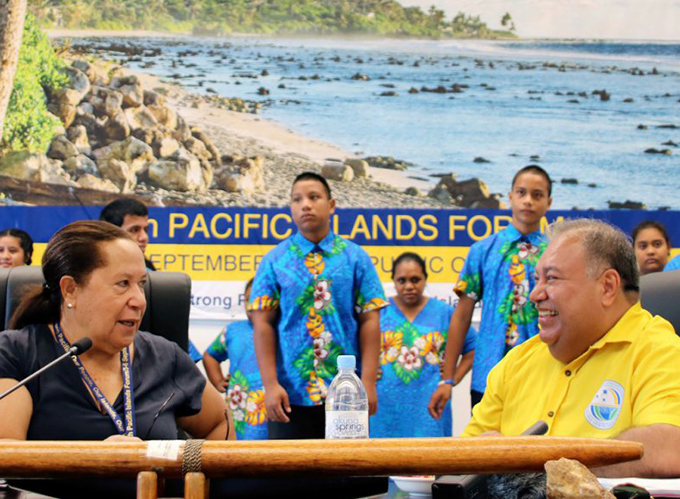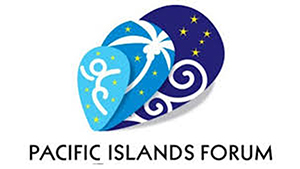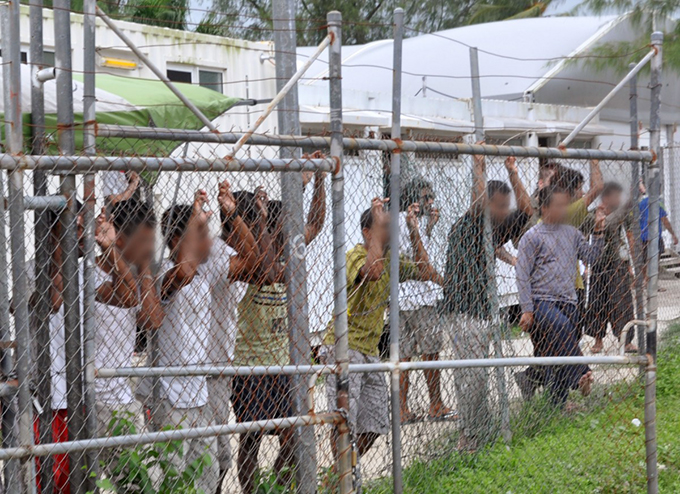
ANALYSIS: The three-hour “detention” of television New Zealand Pacific affairs reporter Barbara Dreaver for “breaking protocols” over interviewing refugees on Nauru. But Josef Benedict reports this is just part of the dismal media freedom scene in the Pacific.
At this week’s gathering of key Pacific Island leaders on the Micronesian island of Nauru, conspicuously missing were journalists from Australia’s public broadcaster.
This was because the South Pacific’s smallest nation has refused visas to journalists from the Australian Broadcasting Corporation to enable them to attend and cover the four-day Pacific Islands Forum leaders summit.
And one of the Pacific’s most experienced journalists, Television New Zealand’s Barbara Dreaver was detained for more than three hours yesterday after interviewing refugees from the notorious Australian-established detention centres on the island. The Nauru government claims she was not “detained”, merely “questioned’.
READ MORE: Self-immolation, hunger strikes and suicide: Children on Nauru want to die
 The Nauru government’s ban on the ABC, it says, is in retaliation for the news organisation’s “blatant interference in Nauru’s domestic politics prior to the 2016 elections, harassment of and lack of respect towards our President and… continued biased and false reporting about our country.”
The Nauru government’s ban on the ABC, it says, is in retaliation for the news organisation’s “blatant interference in Nauru’s domestic politics prior to the 2016 elections, harassment of and lack of respect towards our President and… continued biased and false reporting about our country.”
But some say ABC’s criticism of Nauru’s policies on notorious Australian-run refugee detention centre on the island – plagued by widespread reports of physical, psychological and sexual abuse, with at least five suicide deaths to date – may have more to do with it.
Those controversial camps are not on the agenda and not likely to be a subject of much discussion within the forum which ended today.
And neither is the issue of free speech and media freedom, since efforts to repress critical reporting has become increasingly common among Pacific governments.
Climate change
It is not only climate change and rising sea levels that threaten the lives and wellbeing of Pacific Islanders. Rising levels of official intolerance of dissent and free speech across the region pose a threat to the wellbeing of their democracies.
Indeed, CIVICUS Monitor, an online platform that tracks threats to civil society across the globe, has found that these violations of freedom of expression appear to be systemic in the region.
In Fiji, attempts by the government to intimidate and silence free speech is creating a chilling effect ahead of upcoming national elections and before the date has even been set.
In February, Island Business magazine’s editor and two of its journalists were questioned under the Public Order Act over articles on the firing of a magistrate who had presided over a union dispute.
The 2016 sedition charges against The Fiji Times – widely regarded as the country’s last independent news outlet – saw its publisher, editor-in-chief and two others hauled through the courts over a reader’s letter to the editor that allegedly contained controversial views about Muslims.
Human rights groups believe the charges were politically motivated. The state has filed an appeal against their acquittal.
Journalists in Papua New Guinea often work in fear and many believe media freedom has been eroded. In February this year, PNG Post Courier reporter, Franky Kapin, was attacked and assaulted by staff from the Morobe Province Governor’s office for alleged biased reporting.
Journalists threatened
Journalists continue to be threatened and barred from covering the ongoing crisis at the Australian refugee detention center on Manus Island (after its closure) in the country’s north.
Senior Papua New Guinean journalist Titi Gabi says that increasing outside interference of the editorial process and the bribing and threatening of journalists has led to media freedom no longer being enjoyed in the country.
After a passenger ferry sank in Kiribati in February, leaving 93 people dead, authorities barred foreign journalists from entering the country to report on the disaster.
Meanwhile, the government of Samoa was criticised by a media freedom lobby group earlier this year for seeking to repress freedom of expression by reintroducing legislation on criminal libel without proper public consultation
Civil society groups in the regional power of Australia are extremely concerned about the impact that changes to security laws will have on fundamental freedoms. The National Security Legislation Amendment (Espionage and Foreign Interference) Bill 2017 and the Foreign Influence Transparency Scheme Bill 2017 were met with a storm of protest from media outlets and civil society organisations.
Australian Lawyers for Human Rights has criticised the legislation, warning that the measures will have a “severely chilling effect upon academic research, free speech, and particularly constitutionally-protected free political speech”.
According to Amnesty International Australia, the draconian laws will make it a crime for charities to expose human rights violations, and to communicate with the United Nations about those violations.
Stifled free speech
So, why are governments in the region working to increasingly stifle free speech?
For one, they are coming under growing public scrutiny, led by journalists and civil society using social media, for abuse of power, lack of transparency and corruption at various government levels.
News stories exposing official human rights violations have received global attention, thanks to the efforts of international media and non-governmental organisations. Averse to the negative publicity, Pacific governments have responded with repressive action.
Also, civil society groups in the Pacific are increasingly raising not just national concerns but sensitive regional ones as well, such as rights abuses in West Papua, a region in Indonesia where there is an active pro-independence movement, and in refugee detention centres in Nauru and PNG’s Manus Island.

Seeking to appease regional powerhouses Indonesia and Australia as they appeal for economic investment, governments of small island states have no qualms trying to silence those speaking out on these issues at home.
In turn, the “growing influence of China” has also been cited as a justification for Australia’s new security policies. But many believe another objective is to keep government dealings from the public.
This regional trend flies in the face of Pacific countries’ clear commitments to respect and protect freedom of expression.
Good governance
In 2000, governments signed the Biketawa Declaration committing themselves to democracy, good governance, protection of human rights and maintenance of the rule of law. At the meeting in Nauru, leaders are expected to sign a Biketawa Plus Declaration, building on the original document.
In recent years, island nations have also made commitments to the UN Sustainable Development Goals (SDGs), which include the promotion of peaceful and inclusive societies, access to justice for all and effective, accountable and inclusive institutions at all levels contained in Goal 16. Ensuring fundamental freedoms is pivotal to meeting this goal, as well as the other 16 SDGs.
Leaders at the gathering needed to reiterate their nations’ commitment to fundamental freedoms in its communique and demonstrate it – to create an enabling environment for both the media and civil society to work without fear of criminalisation, harassment and reprisals.
Failing to do so – and the detention of Barbara Dreaver yesterday – are clear signs that the forum is willing to undermine its international obligations and its commitment to democracy and the rule of law.
Josef Benedict is a civic space research officer with global civil society alliance Civicus and a contributor to Asian Correspondent. This article is republished from Asian Correspondent with the permission of the author.











































